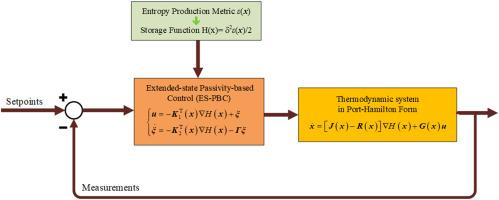The definition of entropy production metric with application in passivity-based control of thermodynamic systems
IF 16.3
1区 工程技术
Q1 ENERGY & FUELS
引用次数: 0
Abstract
Thermodynamic system dynamics exhibit strong nonlinearity and high uncertainty. If a simple control law can effectively regulate the thermodynamic systems, it will substantially reduce the complexity of engineering implementation, commissioning, and maintenance. While passivity-based control has been successfully applied to mechanical, electrical, and electromagnetic systems using energy as a storage function, thermodynamic systems require a different approach due to the non-convex characteristics of their internal energy function. This research defines the entropy production metric and proposes the port-Hamilton realization of the thermodynamic system dynamics. By using the second-order difference of entropy production metric as the storage function, the extended-state passivity-based control is proposed. The control leverages the principle of irreversible thermodynamics that entropy production reaches a minimum at the steady state, ensuring the asymptotic stability of the closed-loop system. The method is applied to design the power-level control law of high-temperature gas-cooled reactors, providing a new perspective on managing thermodynamic system dynamics. Furthermore, the research reveals the impact of control gain on control performance, offering insights for control strategy optimization.

熵产生度量的定义及其在基于被动性的热力学系统控制中的应用
热动力系统动力学具有很强的非线性和高度不确定性。如果一个简单的控制法则能够有效地调节热动力系统,将大大降低工程实施、调试和维护的复杂性。虽然基于被动性的控制已成功应用于使用能量作为存储函数的机械、电气和电磁系统,但由于热动力系统的内能函数具有非凸特性,因此需要采用不同的方法。本研究定义了熵产生度量,并提出了热力学系统动力学的波特-汉密尔顿实现方法。利用熵产生度量的二阶差分作为存储函数,提出了基于扩展状态被动性的控制。该控制利用了不可逆热力学原理,即熵产生在稳态时达到最小,从而确保了闭环系统的渐近稳定性。该方法被应用于设计高温气冷反应堆的功率级控制法,为管理热力学系统动力学提供了新的视角。此外,研究还揭示了控制增益对控制性能的影响,为控制策略优化提供了启示。
本文章由计算机程序翻译,如有差异,请以英文原文为准。
求助全文
约1分钟内获得全文
求助全文
来源期刊

Renewable and Sustainable Energy Reviews
工程技术-能源与燃料
CiteScore
31.20
自引率
5.70%
发文量
1055
审稿时长
62 days
期刊介绍:
The mission of Renewable and Sustainable Energy Reviews is to disseminate the most compelling and pertinent critical insights in renewable and sustainable energy, fostering collaboration among the research community, private sector, and policy and decision makers. The journal aims to exchange challenges, solutions, innovative concepts, and technologies, contributing to sustainable development, the transition to a low-carbon future, and the attainment of emissions targets outlined by the United Nations Framework Convention on Climate Change.
Renewable and Sustainable Energy Reviews publishes a diverse range of content, including review papers, original research, case studies, and analyses of new technologies, all featuring a substantial review component such as critique, comparison, or analysis. Introducing a distinctive paper type, Expert Insights, the journal presents commissioned mini-reviews authored by field leaders, addressing topics of significant interest. Case studies undergo consideration only if they showcase the work's applicability to other regions or contribute valuable insights to the broader field of renewable and sustainable energy. Notably, a bibliographic or literature review lacking critical analysis is deemed unsuitable for publication.
 求助内容:
求助内容: 应助结果提醒方式:
应助结果提醒方式:


